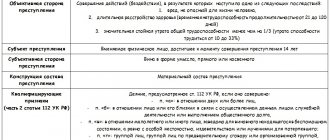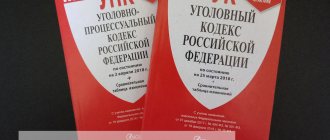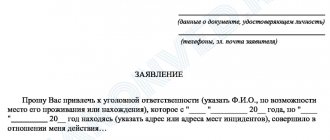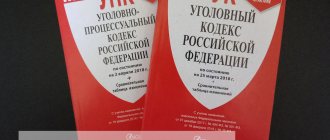ST 113 of the Criminal Code of the Russian Federation.
Intentional infliction of grievous or moderate harm to health, committed in a state of sudden strong emotional excitement (affect) caused by violence, mockery or grave insult on the part of the victim or other illegal or immoral actions (inaction) of the victim, as well as a long-term psychotraumatic situation that arose in connection with systematic illegal or immoral behavior of the victim - is punishable by correctional labor for a term of up to two years, or restriction of freedom for a term of up to two years, or forced labor for a term of up to two years, or imprisonment for the same term.
Commentary to Art. 113 Criminal Code
1. According to the main objective and subjective characteristics, the analyzed crime coincides with the act provided for in Art. 107 of the Criminal Code. The differences lie in the object of the crime (it is recognized as human health) and in the socially dangerous consequences (they are serious harm to health and moderate harm).
2. Infliction of grievous or moderate harm to health by two or more victims in a state of passion is qualified under Art. 113 of the Criminal Code, and such a state of the perpetrator must be caused by the unlawful or immoral behavior of both victims.
3. In qualifying the infliction of grievous bodily harm in a state of passion, resulting in the death of the victim through negligence, at least four options are possible. It seems that in this case it would be correct to prosecute the perpetrator only for causing grievous bodily harm in a state of passion (Article 113 of the Criminal Code), since it is unlikely that in such a state the person could have foreseen that his actions would lead to the death of the victim. In a state of strong emotional excitement, the guilty person’s field of consciousness narrows and, as a rule, he foresees only the immediate consequences of his actions. In addition, when qualifying an act according to the totality of Art. 113 and 109 of the Criminal Code, a person will be punished more severely than, for example, in the case of murder in a state of passion. Judicial practice also qualifies what was done in the situation under consideration only under Art. 113 CC.
Article 113. Causing grievous or moderate harm to health in a state of passion
Cassation ruling of the Judicial Collegium for Criminal Cases of the Supreme Court of the Russian Federation dated June 27, 2018 N 11-UD18-22 In the cassation appeal, the convicted Khasyanova L.N. expresses disagreement with the verdict passed against her and with subsequent court decisions, considers them unfair due to the excessive severity of the imposed punishment. Believes that the court did not take into account the specific circumstances of the crime. She claims that she had no intent to cause the death of the victim, she stabbed her with a knife while in a psycho-emotional state caused by his illegal and immoral behavior, but the court unreasonably did not recognize this circumstance as a mitigating one in accordance with paragraph “h” of Part 1 of Art. of the Criminal Code of the Russian Federation, while the court’s conclusions are unmotivated. She also believes that the court unreasonably did not take into account positive data about her personality, lack of criminal record and did not apply the provisions of Art. Art. , the Criminal Code of the Russian Federation, since at the time of the crime she had a dependent minor child. The higher courts did not take these circumstances into account. Taking into account the above, she asks to change the verdict and subsequent court decisions, to reclassify her actions under Art. 113 of the Criminal Code of the Russian Federation or paragraph “z” of Part 2 of Art. 111 of the Criminal Code of the Russian Federation and impose punishment using Art. Art. , Criminal Code of the Russian Federation.
Appeal ruling of the Judicial Collegium for Criminal Cases of the Supreme Court of the Russian Federation dated January 30, 2018 N 9-APU17-25
the convicted Lukanin disputes the validity of the conviction and claims that R. incriminated himself in the murder under pressure from law enforcement officers. His actions towards S. in connection with the immoral behavior of the victim should be qualified under Art. 113 of the Criminal Code of the Russian Federation. The court's conclusions are based on assumptions and inadmissible evidence, R. killed S. Considers the sentence excessively strict;
Determination of the Judicial Collegium for Criminal Cases of the Supreme Court of the Russian Federation dated September 26, 2017 N 9-N17-1
according to Part 2 of Art. 113 of the Criminal Code of the RSFSR (as amended in 1922) with punishment under Part 2 of Art. 106 of the Criminal Code of the RSFSR to 5 years in prison; according to Part 2 of Art. 114 of the Criminal Code of the RSFSR (as amended in 1922) to 3 years of imprisonment with strict isolation;
Appeal ruling of the Judicial Collegium for Criminal Cases of the Supreme Court of the Russian Federation dated December 19, 2017 N 51-APU17-16
- August 15, 1994 by the Altai Regional Court (taking into account changes made by the decisions of the Rubtsovsky City Court of the Altai Territory dated March 12, 2001 and December 16, 2004) under Art. and pp. “a”, “e” art. 102 of the Criminal Code of the RSFSR, paragraphs “a”, “d”, art. 102 of the Criminal Code of the RSFSR, art. 113 Criminal Code of the RSFSR, Part 2, Art. 159 of the Criminal Code of the Russian Federation (as amended by the Federal Law of 2003), part 3 of Art. 148 of the Criminal Code of the RSFSR, in accordance with Part 1 of Art. Criminal Code of the RSFSR to 14 years 6 months in prison, with the first five years to be served in prison. Released on January 25, 2008 after serving his sentence;
Cassation ruling of the Judicial Collegium for Criminal Cases of the Supreme Court of the Russian Federation dated November 10, 2020 in case No. 73-UDP20-8SP-A5
- June 13, 2002 by the Oktyabrsky District Court of Ulan-Ude under Art. 113 of the Criminal Code of the Russian Federation to 2 years in prison, on the basis of Art. of the Criminal Code of the Russian Federation for the totality of sentences by adding with the unserved part of the sentence under the sentence of November 18, 1998 - to 6 years in prison; by decision of the Oktyabrsky District Court of Ulan-Ude dated June 6, 2006, he was released on parole for an unserved sentence of 1 year 6 months 6 days;
Determination of the Judicial Collegium for Criminal Cases of the Supreme Court of the Russian Federation dated October 20, 2020 in case No. 80-UD20-4-A4
Kulagin S.V. cohabited with P., the ex-wife of the victim P., who abused alcohol, did not pay child support, and prevented the exchange of living space. It is to solve these problems that Kulagin S.V. decided to talk to the victim. He took Kulagin's brother Vadim with him solely for moral support. However, upon meeting P., he immediately began to insult him, which, together with the victim’s bullying of his ex-wife (the beloved woman of Kulagin S.V.), caused the latter to experience a state of physiological affect, and he, not fully aware of his actions, inflicted multiple blows on the victim . In this regard, the actions of Kulagin S.V. subject to qualification under Art. 113 of the Criminal Code of the Russian Federation as causing grievous harm to health in a state of passion. The court did not adequately establish the psychological state of S.V. Kulagin. for the period of this conflict. The expert psychologist was not questioned by the court. In the case, the defense's requests to appoint S.V. Kulagin were unreasonably rejected. inpatient psychological and psychiatric examination, despite the presence of information about the presence of mental disorders in close relatives of Kulagin S.V. - his father, brother and daughter. According to lawyer A.D. Moroz, the brother of the deceased (P.) was illegally, without taking into account the order established by law, recognized as the victim, although the victim was P., the daughter of the deceased;
Third commentary to Article 113 of the Criminal Code of the Russian Federation
1. The disposition of the article is of a referential nature, since we are talking about the infliction of previously studied types of harm to health, which are covered by Art.
Art. 111 and 112 of the Criminal Code. But the objective side contains an important mandatory feature - a situation that is characterized by negative, illegal or immoral behavior of the victim. 2. The subjective side also includes another mandatory feature - the special emotional state of the perpetrator. It acts in a state of physiological affect, i.e. sudden strong emotional disturbance. The signs of such a condition have been carefully analyzed in relation to Art. 107 of the Criminal Code, and there is no need to repeat them. 3. It is important to take into account that this provision contains a privileged corpus delicti, which provides for mitigating circumstances. Firstly, this concerns the age of criminal responsibility, which is possible when a person reaches the age of 16 years. Secondly, a special role is given to the figure of the victim. His behavior is regarded as a provoking factor, so the intent of the perpetrator can be direct or indirect, but only suddenly arisen. The latter circumstance gives the right to speak about the impossibility of classifying the actions of the perpetrator as an attempt to cause harm to health of this severity. ‹ Article 112. Intentional infliction of moderate harm to healthUp Article 114. Infliction of grievous or moderate harm to health by exceeding the limits of necessary defense or by exceeding the measures necessary to apprehend the person who committed the crime ›
Composition of crimes involving grievous bodily harm
In the legislation of the Russian Federation, causing severe harm to health in a state of passion is combined with harm of moderate severity into one article. In order for a person to be charged with such a charge, the crime must include:
- facts confirming that the offender was in a state of passion at the time of committing the illegal act.
- A conclusion certified by doctors indicating that the plaintiff had serious health consequences due to an attack by the defendant.
- The relationship between the victim’s behavior and the onset of a state of passion in the accused must be clearly visible. The legislation characterizes such behavior as “illegal or immoral.”
Restrictions from other compounds
Such cases are considered in a special manner due to the presence of a mitigating circumstance . The legislation draws an analogy with Art. 107 of the Criminal Code. Within its framework, attacks on human life are considered.
In this case, the difference is that there is an attack on health, but with serious consequences if damage is caused to a high degree of severity.
Also, a crime of this nature is delimited from Art. 111, which considers causing grievous bodily harm intentionally. An attack in a state of passion will also be considered intentional, but a special circumstance partially changes the course of the case in favor of the accused. Although he will still suffer punishment, unless the affect is recognized as pathological.
Laws regulating liability for this act
Infliction of grievous bodily harm committed in a state of passion is regulated by Art. 113 of the Criminal Code of the Russian Federation. A mandatory condition in it is that in the situation before the court there must be a deliberate or accidental provocation on the part of the victim . It can be either one-time or ongoing over a period of time.
Mitigation of liability in comparison with a similar action without passion is also provided for in Art. 61 of the Criminal Code, paragraph 1. It states that if the victim gave rise to such an act on the part of the accused with his “immoral or illegal behavior,” then this reduces the guilt and responsibility of the criminal .
In the article itself 113 is about.
Article 113. Causing grievous or moderate harm to health in a state of passion
Intentional infliction of grievous or moderate harm to health, committed in a state of sudden strong emotional excitement (affect) caused by violence, mockery or grave insult on the part of the victim or other illegal or immoral actions (inaction) of the victim, as well as a long-term psychotraumatic situation that arose in connection with systematic illegal or immoral behavior of the victim, is punishable by correctional labor for a term of up to two years, or restriction of freedom for a term of up to two years, or forced labor for a term of up to two years, or imprisonment for the same term.
In addition to physiological and pathological, affect is also divided into ordinary and cumulative.
- The first is caused by a single reason.
- The second implies a number of such reasons, extended over time and, perhaps, quite insignificant.
Cumulative affect can be called the result of the “last straw” when the accused runs out of patience. Both cases are considered by the court under Art. 113.
IMPORTANT. In Art. 113, art. 61 and when considering the case as a whole, the fact that the state of passion must be caused precisely by the behavior of the victim is especially highlighted. Extraneous reasons not relevant to the situation are not taken into account.
Suppose, if the victim was “harassed” at work for a long time, and he snapped at a passerby, then under Art. 113, the case will no longer be considered, just as there will be no mitigating circumstance under Art. 61.






